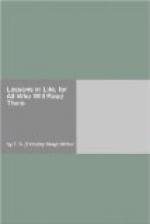About the same time that this interview took place, Marston was alone, thinking with sad and softened feelings of the past. The letter of Arnest was before him; he had turned it over by accident.
“He could not have been himself when he wrote this,” he thought. It was the first time he had permitted himself to think so. “My words must have stung him severely, lightly as I uttered them, and with no intention to wound. This matter ought not to have gone on so long. Friends are not so plentiful that we may carelessly cast those we have tried and proved aside. He has many excellent qualities.”
Pride came quickly, with many suggestions about self-respect, and what every man owed to himself.
“He owes it to himself to be just to others,” Marston truly thought. “Was I just in failing to apologize to my friend, notwihstanding this offensive letter? No, I was not; for his action did not exonerate me from the responsibility of mine. Ah, me! How passion blinds us!”
After musing for some time, Marston drew towards him a sheet of paper, and, taking up a pen, wrote:
“MY DEAR SIR:—What I ought to have done years ago, I do now, and that is, offer you a sincere apology for light words thoughtlessly spoken, but which I ought not to have used, as they were calculated to wound, and, I am grieved to think, did wound. But for your note, which I enclose, I should have made this apology the moment I had an opportunity. But its peculiar tenor, I then felt, precluded me from doing so. I confess that I erred in letting my feelings blind my cooler judgment.
“Your old friend, MARSTON.
“To Mr. Herbert Arnest.”
Enclosing the note alluded to in this letter, Marston sealed, and, ringing for an attendant, despatched it.
“Better to do right late than never,” he murmured, as he leaned pensively back in his chair.
“Let what will come of it, I shall feel better, for I will gain my own self-respect, and have an inward assurance that I have done right,—more than I have for a long time had, in regard to this matter at least.”
Relieved in mind, Marston commenced looking over some papers in reference to matters of business then on hand, and was soon so much absorbed in them, that the subject which had lately filled his thoughts faded entirely therefrom. Some one opened the door, and he turned to see who was entering. In an instant he was on his feet. It was Arnest.
The face of the latter was pale and agitated, and his lips quivered. He came forward hurriedly, extending his hand, not to grasp that of his old friend, but to hold up his own letter that had been just returned to him.
“Marston,” he said, huskily, “did I send you this note?”
“You did,” was the firm but mild answer.
“Thus I cancel it!” And he tore it into shreds, and scattered them on the floor. “Would that its contents could be as easily obliterated from your memory!” he added, in a most earnest voice.




